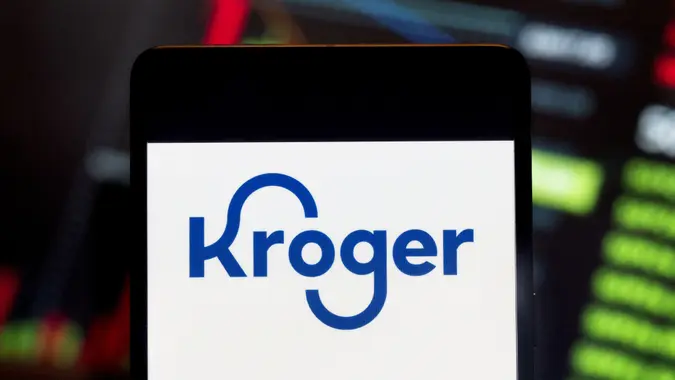The Top 5 Grocery Store Stocks — Which One Has the Best 5-Year Returns?

Commitment to Our Readers
GOBankingRates' editorial team is committed to bringing you unbiased reviews and information. We use data-driven methodologies to evaluate financial products and services - our reviews and ratings are not influenced by advertisers. You can read more about our editorial guidelines and our products and services review methodology.

20 Years
Helping You Live Richer

Reviewed
by Experts

Trusted by
Millions of Readers
Want to get back some of the money you spend at your local market? Consider buying grocery store stocks. While certainly more pedestrian than high-flying names like Nvidia or Microsoft, Albertsons, Kroger, and many other grocery store chains are also multi-billion-dollar companies with publicly traded stock shares.
Generally speaking, these types of stocks are lower-growth, lower-margin companies that rarely make headlines. But their defensive nature can make them hold up well in recessions or during market selloffs, as customers must continue to buy food and home supplies no matter how the economy is doing.
Here’s a look at how the top five grocery store stocks in terms of market capitalization have performed over the past 5-, 10-, and 15-year periods, and what analysts predict going forward for these companies.
Note that for purposes of this analysis, only companies strictly categorized as grocery stores are included. Big-box stores like Walmart and Costco are excluded because of their diverse retail presence, even though Walmart, for example, generates more grocery revenue than any store in the world.
Kroger (KR)
- Stock price as of July 11: $70.08
- Dividend yield: 1.98%
- Market capitalization: $46.75 billion
- YTD performance: +15.62%
- 5-year performance: +130.41%
- 10-year performance: +131.11%
- 15-year performance: +825.39%
- One-year price forecast: $74.50
Kroger has by far the biggest market capitalization of any grocery store in the United States, making it the big dog in the industry. In addition to its namesake stores, it owns a wide variety of popular grocery store brands, including Ralphs, Food 4 Less, Dillons, Fred Meyer, Fry’s, Pay-Less Super Markets, Pick’n Save and Smith’s Food and Drug. The company traces its origins back to 1883.
Sprouts Farmers Market (SFM)
- Stock price as of July 11: $157.77
- Dividend yield: N/A
- Market capitalization: $15.53 billion
- YTD performance: +24.91%
- 5-year performance: +526.6%
- 10-year performance: +511.03%
- 15-year performance: +333.12%
- One-year price forecast: $183.15
Sprouts is less known than the Kroger family of brands because it only operates in 23 states. However, it still boasts the second-largest market cap of any grocery store company. The company is known for its focus on natural and organic food, including its bulk food offerings. Unlike some of its competitors, Sprouts only operates under its namesake brand.
Albertsons (ACI)
- Stock price as of July 11: $22.26
- Dividend yield: 2.69%
- Market capitalization: $12.57 billion
- YTD performance: +13.44%
- 5-year performance: +109.22%
- 10-year performance: +108.5%
- 15-year performance: +108.5%
- One-year price forecast: $24.56
Albertsons, like Kroger, owns a wide range of well-known grocery retailers in addition to its namesake brand. The company operates over 2,270 outlets across 34 states under brands ranging from Safeway and Vons to Pavilions and Jewel-Osco.
Weis Markets (WMK)
- Stock price as of July 11: $74.81
- Dividend yield: 1.82%
- Market capitalization: $2.01 billion
- YTD performance: +10.47%
- 5-year performance: +71.53%
- 10-year performance: +125.56%
- 15-year performance: +243.81%
- One-year price forecast: N/A
Compared to the giants on this list, Weis Markets is a much smaller grocery store chain, although it still qualifies as a mid-cap stock with its $2 billion valuation. The company, which was founded in 1912, is still very much a regional business, with stores in only seven states (Delaware, Maryland, Pennsylvania, New Jersey, New York, Virginia, and West Virginia).
Grocery Outlet Holding (GO)
- Stock price as of July 11: $13.10
- Dividend yield: N/A
- Market capitalization: $1.26 billion
- YTD performance: -17.49%
- 5-year performance: -69.62%
- All-time performance (went public on June 20, 2019: -59.55%
- One-year price forecast: $15.62
Grocery Outlet is known not just for its catchy “Grocery Outlet, Bargain Market” jingle but also for the different store experience it offers to its shoppers. Selling excess or near-expiration goods it picks up from other stores, Grocery Outlet provides its customers with something of a “treasure hunt” experience, as they can never be sure what will be available at the store. The small-cap company doesn’t pay a dividend and has had a rough go at it in terms of stock price performance.
 Written by
Written by  Edited by
Edited by 























